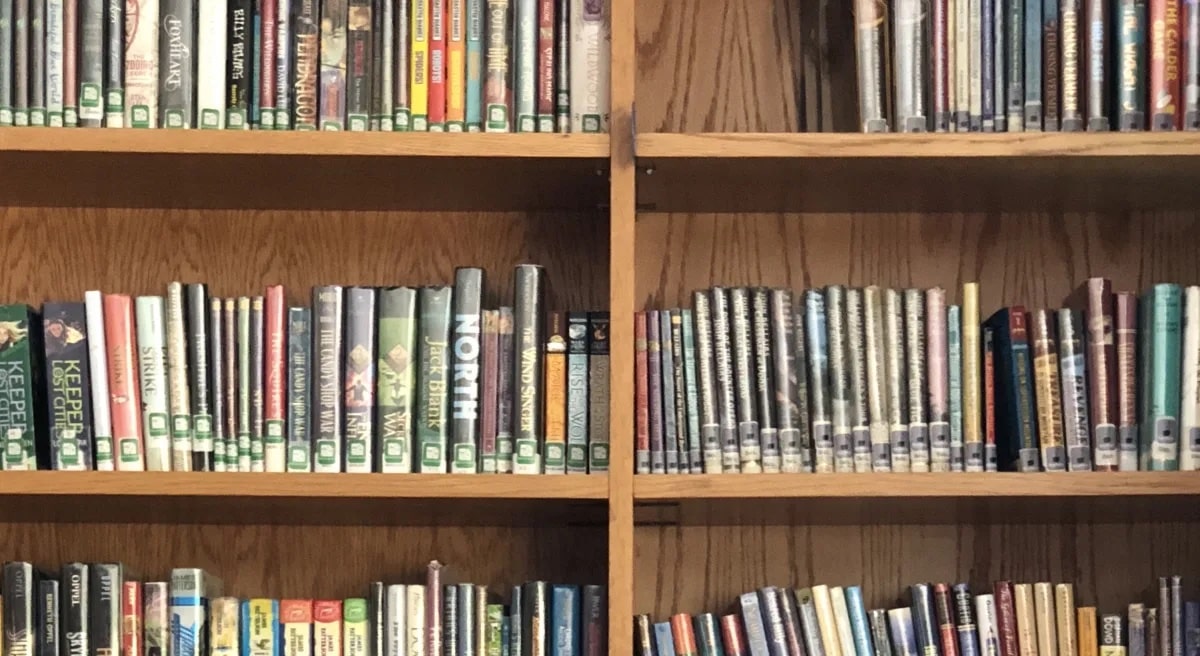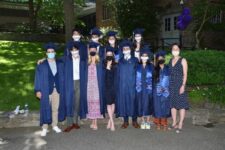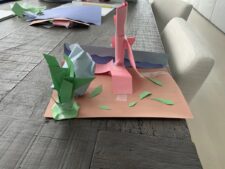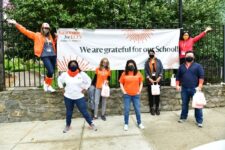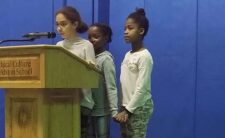In the waning days of summer 2020, the Ethical Culture Fieldston School faculty and staff returned early to school — checking in from computer screens across the New York City metropolitan area and beyond. Typically not back on campus before Labor Day, the faculty and staff were responding to an unprecedented spring and summer that would drastically change the entire ECFS experience. Our colleagues gathered for a week of professional development (PD) — a cornerstone of ECFS’s approach to continuous learning.
Professional development can take myriad forms: books, articles, institutes, workshops, experiences, or conversations. PD takes place continually at ECFS, with faculty and staff regularly participating in various learning opportunities both collectively and individually. These efforts, says Assistant Head of School for Ethical Education & Social Impact Liz Fernández, can serve to improve skills that people across the institution use in all facets of their roles, whether in the classroom, coaching, advising, making decisions, participating in committee meetings, or supporting students and families. “This year in particular, we shifted to a tailor-made design approach for PD and away from the idea that one size fits all,” Fernández says.
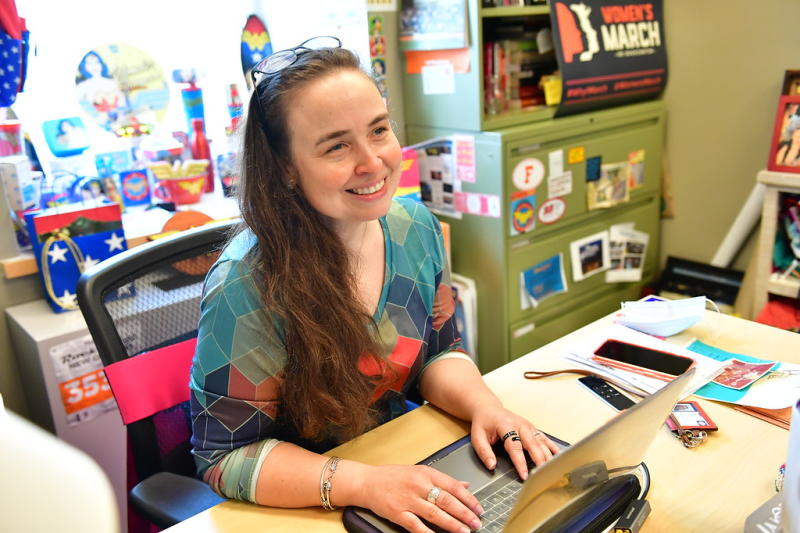
The ECFS approach to professional development is both of the moment and forward-thinking: Fernández describes a responsive program that exists as a multiyear plan. “We ask ourselves, ‘Where do we want to be institutionally in the next year? In three years? In the next five years?’” Fernández says. “And then we work backward.”
In addition to taking advantage of individual PD opportunities, the faculty as a whole meet at designated periods throughout the school year. 2020’s late-summer PD programming aimed to respond to the “trauma experiences that people were collectively having — our students, our families, and our colleagues,” Fernández says, referencing the twin pandemics of COVID-19 and systemic racism. The session also addressed the nuances of providing feedback and assessing students, given the partly-remote, uncertain year. The programming also focused on technology in a way that “refreshed, enhanced, and elevated the skills that our colleagues already had,” she says.
At the end of each summer, the School hosts the Progressive Teaching Institute (PTI), a three-day event that welcomes new faculty to ECFS and showcases the work of returning faculty, with a goal of demonstrating leadership and providing mentorship in progressive teaching. In workshops like one that explored a model lesson plan for decentering whiteness in curricula, faculty and staff discussed what PTI Director Arhm Choi Wild, who also serves as a Diversity, Equity, and Inclusion (DEI) Coordinator at both Fieldston Middle and Fieldston Upper, calls “an everyday toolkit” for equitable education.
In the fall, PD continued with sessions built on the summer’s work, furthering the School’s long-term goals of imbuing anti-racism and anti-bias into all aspects of our student’s education — what Head of School Jessica Bagby calls “an act of care” for our community.
Planning the 2020–2021 academic year’s PD programming took into consideration the School’s needs specific to the unique moment. Fernández engaged the assistant principals of academic and student life across the School’s four divisions, asking them to report what they’d heard from their colleagues and in their COVID-19 Pandemic Response Task Force meetings, which the School had instituted at the end of the previous academic year. In conversations with the Ethics and Technology team, Fernández synthesized that data with feedback from students, families, faculty, and staff, creating a series of offerings that were responsive to the needs of the community.
Planning also took into account a massive logistical hurdle: PD had to be reimagined for a remote setting (and indeed, when the PTI portion was planned, it had originally been intended as an in-person event). “As a member of the planning committee and citizen of what feels like a nation under siege experiencing competing pandemics, my skills, patience, and creativity were certainly tested,” says Aria Gee, Fieldston Middle and Fieldston Upper Ethics Teacher, who served on the PTI planning committee with Kathy Andrade, Assistant Director of Human Resources; Karen Drohan, Fieldston Upper History Teacher; Mica McGriggs, Fieldston Middle Diversity, Equity, and Inclusion Coordinator; Cristina Ross, Ethical Culture Language and Ethics Teacher; and Ingrid Sabogal, Fieldston Middle Ethics and Technology Coordinator. The School’s Technology team — which Fernández calls “spectacular” — took on the monumental task of creating an all-online set of programming in the late summer and fall.
In the planning of PD, Fernández says the goal was especially to “center the voices of Black, Indigenous, and People of Color (BIPOC) in a range of areas: restorative practice work, direct curriculum impact, conflict mediation and resolution, addressing self-care, and more.”
The late-summer programming entailed almost 40 workshops and keynote presentations based on developmental stages, broken down by topics based on the data Fernández and her team had gleaned. Topics included creating meaningful and sustainable feedback structures in a remote setting, hybrid teaching that addresses the whole child, trauma-informed liberatory education, assessment and grading practices, and maintaining connection through a computer screen.
In October, faculty and staff met again. At Fieldston Lower and Ethical Culture, the sessions responded to feedback on the summer’s PD: a request for more trauma-informed teaching and time to do divisional work in small groups. At Fieldston Middle and Fieldston Upper, departments came together to work through complex issues such as revising curriculum or pedagogical approaches.
And before Fall Recess, faculty and staff met for their last collective PD experience of 2020. Over two days, colleagues embarked on a series of workshops and conversations developing anti-racist and anti-bias strategies. One overwhelmingly popular option (which indeed required a waitlist, since participation was capped at 65 participants) was the Courageous Conversation Protocol workshop, hosted by the Pacific Education Group. The award-winning protocol engages deep and nuanced interracial dialogue, helping institutions like ECFS address bias and racial disparities. The School aims to train all of its employees in the protocol over the next few years.
For the rest of the faculty and staff, those PD days offered fifteen workshops that featured a DEI-related, anti-bias, anti-racist training experience. The School engaged former colleagues, former parents, and experts from various industries to lead workshops and discussions, including workshops titled “Lessons from the Black@ Movement,” “Harnessing My Power as an Educator to Respond Effectively to Post-Election Issues,” and “Saving Ourselves: Self-Care for People of Color in Independent Schools.”
For the faculty and staff, the 2020 PD provided ample enhancement to their already impressive skill sets. “I feel like I am walking away from this week not only feeling like I made a few connections, but also knowing that I have concrete skills and ideas I can take with me into the year,” said one teacher. “Interesting, informative, and useful,” said another. “I loved that BIPOC facilitators were strongly featured and centered. I loved that there were affinity spaces. I loved that the day was not too full,” added one more.
The learning continues: Sessions were recorded and resources made available to our faculty and staff, who can catch up on offerings that they missed or want to revisit to deepen and affirm their skill development. In this way, the year’s PD programming becomes a living resource that our colleagues can come back to over time, strengthening their skill sets and responding to the community’s changing needs.
“The challenges of the moment have really encouraged and demanded all of us to reimagine what teaching, what learning, and what leading look like,” Fernández says. Professional development programming is key to that reimagining — bringing faculty and staff together in fellowship to grow as educators and respond to an ever-changing list of needs.
And while PD looks different than in years past, the School responded by emphasizing and indeed increasing the amount of PD, recognizing how critical this opportunity was for our faculty and staff. In keeping with the ECFS ethos, the School approached the challenges of the year head-on. As Fernández puts it, “This was a radical year. There was radical change, and this was a radical learning experience.”
